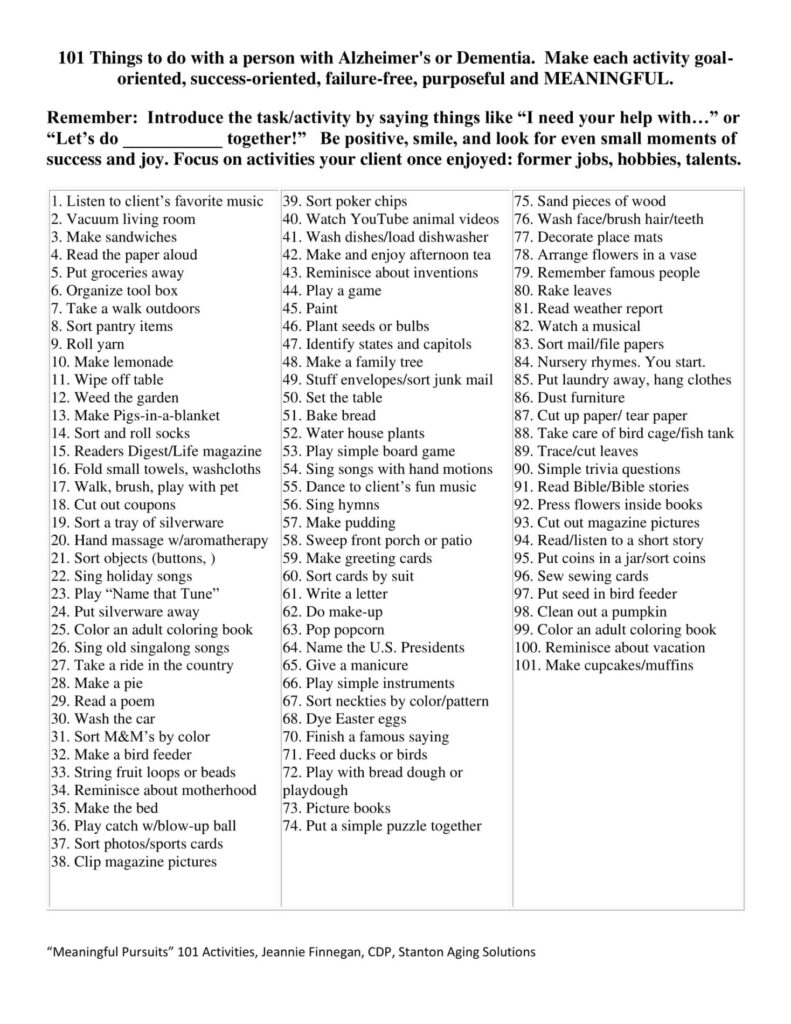
By Jeannie Finnegan, CDP, Elder Care & Dementia Care Specialist at Stanton Aging Solutions
Anyone caring for loved ones with Alzheimer’s or dementia will at some point struggle with how to spend meaningful time with their loved one or add purpose to their lives. Family visits can feel awkward, pointless, or sad as we grapple with our loved one’s cognitive decline and memory loss, and it can become very challenging to have a meaningful visit. However, those with Alzheimer’s or a related dementia still have the need and capacity for meaning and purpose in life – they just need someone to guide them into appropriate activities that can add greatly to their happiness and quality of life. We can start with asking ourselves what has most brought meaning to our own lives, or to our loved one during their lifetime:
- Relationships with family and friends
- Spirituality and church activities
- Career
- Caring for the home
- Music
- Theater
- Helping others
- Sports
- Hobbies
- Enjoying nature
- Learning and education
- Travel
How to Select Activities
These ideas above can be your guide when exploring ideas for activities with those you care for. Meaningful pursuits we create for those we care for, no matter what their level of Alzheimer’s or dementia, need to be:
- Personally meaningful to them
- Doable
- Valued by them
- Cognitively stimulating (especially sensory stimulation)
- Familiar
- Guided activities that involve goals, tasks, helping, serving, creating, learning
- Positive experiences
Real-life meaningful pursuits should include life skills that individuals have performed all their lives.
Many activities are multisensory (stimulating more than one sense at a time), are cognitively stimulating, overlap with other categories of tasks, and connect individuals to pleasant memories, experiences and people, which adds meaning and purpose to their lives. The following activity categories can be tailored to an individual’s interests, past experiences, and cognitive abilities:
- Music
- Sensory – Visual, Hearing, Touch, Smell, Taste
- Spirituality
- Homemaking/Home Maintenance
- Sorting & Organizing
- Gardening
- Outdoor/Nature
- Movement, Dance, Exercise
- Creating (music, art, etc.)
- Hobbies, Work, Sports
- Personal Care/Beauty
- Reminiscence
- Humor
- Puzzles & Games
We also want to ask: What is the highest level of this activity that my loved one can still safely do on his/her own or with assistance?
For example, perhaps your loved one was on a bowling league for years. Could they still manage to bowl at a duckpin bowling alley? Or perhaps they are only able to use a plastic bowling set at home. Or maybe they can only review pictures of bowling or you could read to them about bowling or watch a bowling tournament on TV. It is okay to continue to challenge your loved one a little, keeping all safety concerns and doctor’s approval in mind. You may be surprised at how your loved one responds and what they are able to do, learn, and recall.
Reminiscence Activities
Reminiscence is an activity that requires nothing but the desire to engage your loved one in meaningful remembering that may bring them joy, add to their confidence, and affirm their identity. Long-term memories are often quite well preserved, even with moderate to advanced dementia. While you can make reminiscing as elaborate an activity as you want to (for example, documenting your loved one’s life story or reorganizing old photos and talking about memories), you can also simply start with these prompts:
- Tell me about a day you once spent at the beach
- Tell me about your first job
Tell me about a high school dance you went to - Tell me about the day you enlisted
- Tell me about the day you got married
- Tell me about the time you …
Be Positive and Encouraging
There are many other ideas for engaging those we care for in activities that are meaningful, purposeful, success-oriented, and rewarding, such as creating sensory boxes, kitchen and food preparation tasks, sorting and organizing, personal care, musical activities, crafts and holiday decorating, and humorous activities. If you find it challenging to interest your loved one in meaningful pursuits, make sure to introduce the task/activity by saying things like, “I need your help with …” or “Let’s do ___________ together!” Focus on activities your family member once enjoyed – former jobs, hobbies, and talents. It may help to gently guide them through an activity, perhaps by putting your hand over theirs as needed, or having them imitate what you do. Most importantly, be positive, smile, encourage, and look for moments of success, remembrance, and joy – however small.
Create Special Times to Treasure
You will be challenged emotionally, physically, and spiritually, but you will also know you have eased the journey of your loved one and found ways to add meaning and joy to their lives, and yours. As time goes on and the disease progresses, expect changes in your loved one – personality, appearance, interests, and more. Meaningful pursuits help you get to know new aspects of who your loved one is and give you new reasons to love them.
Meaningful pursuits will help frame your relationship with your loved one, anchoring it in the here and now. As your loved one loses the past, you can cultivate new ways to connect and build a new history in the time you have together.
The ideas for meaningful activities for those with Alzheimer’s or dementia are limitless, but for a list of 101 of our favorite easy-to-do activities, see the image below. If you’d like more information on how to effectively engage your loved one and spend meaningful time with them, please contact us at (443) 812-1028, help@stantonagingsolutions.com or with our Contact Form. We’d love to help.


Leave a Reply
You must be logged in to post a comment.